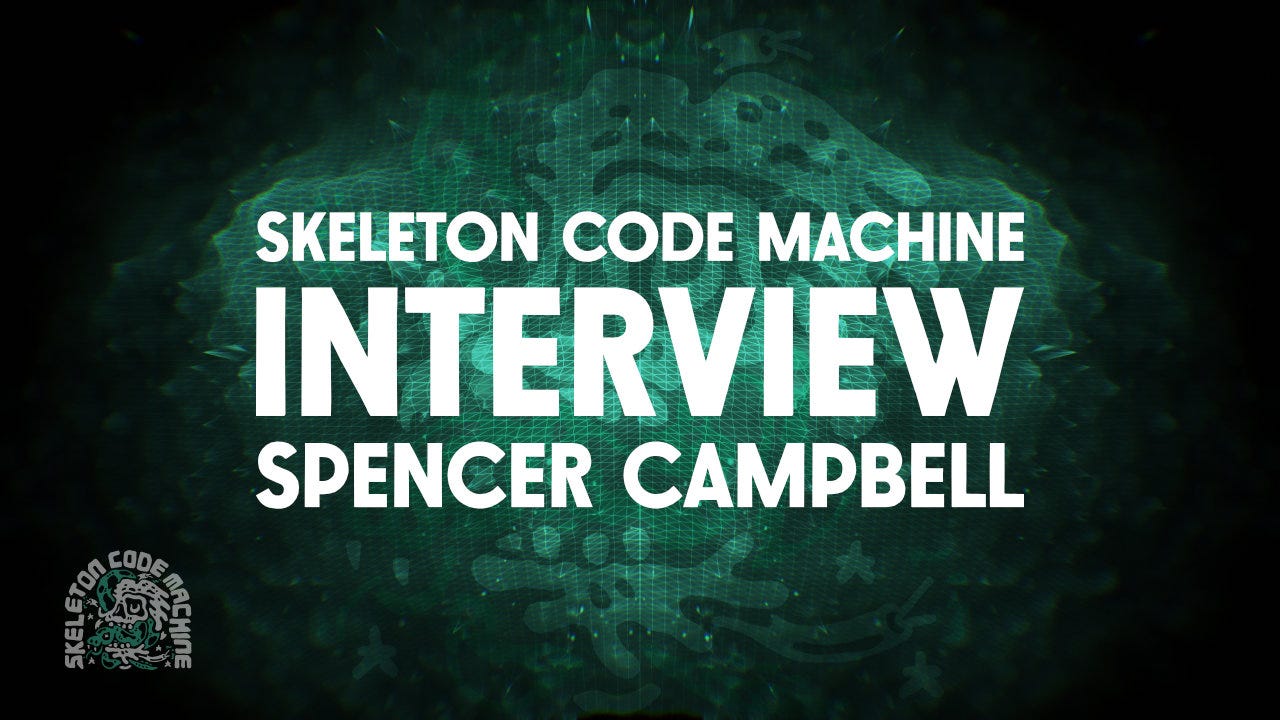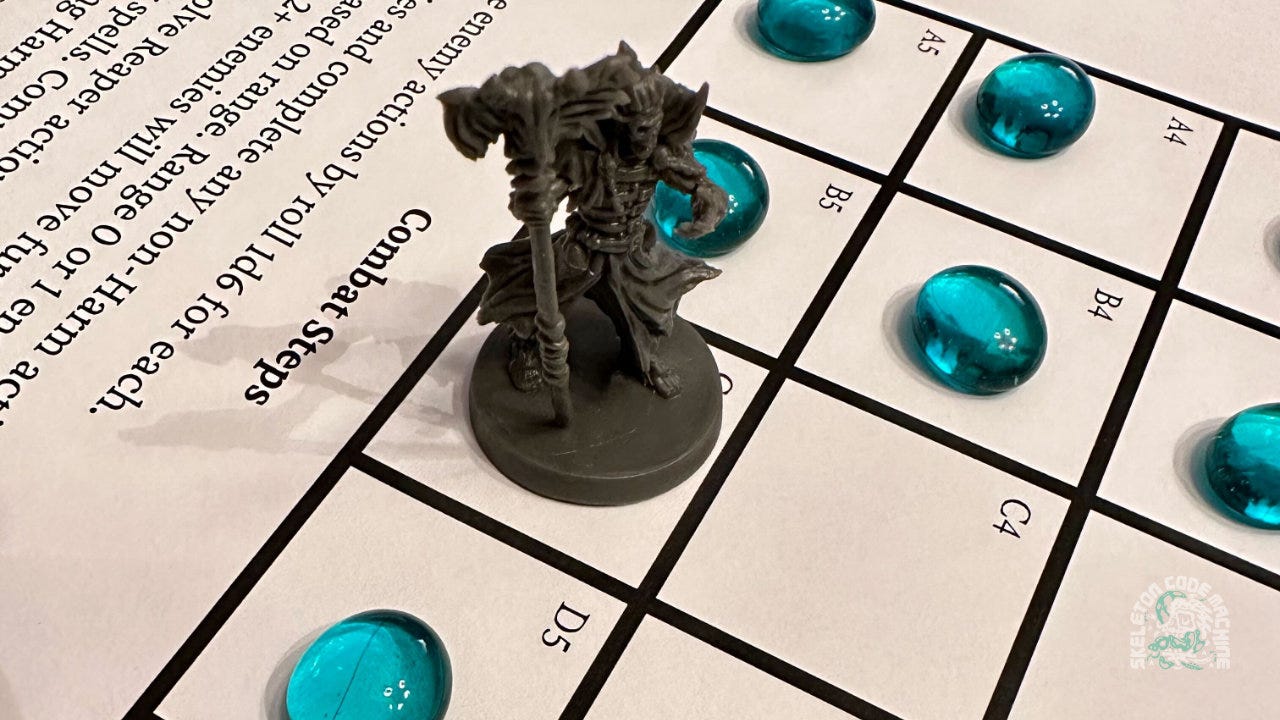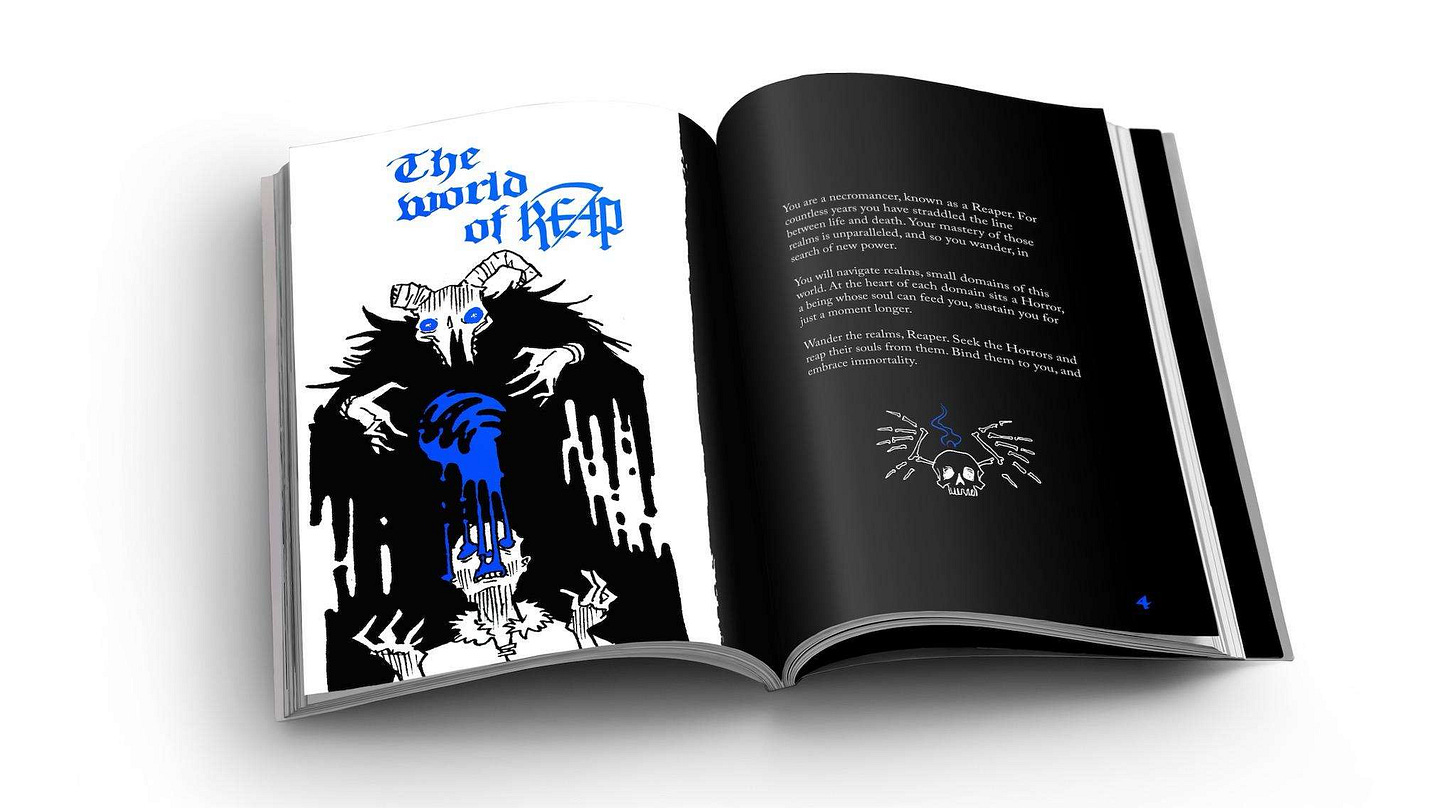Interview: Spencer Campbell (Part 2)
The second half where we talk about rules, clocks, combat, and more.
This is Part 2 of the interview. Part 1 is available, and was posted on Tuesday.
This is the second half of my interview with Spencer Campbell. If you haven’t read the first part yet, here it is: Interview: Spencer Campbell (Part 1).
Spencer (publishing as Gila RPGs) might be best known for his games RUNE, NOVA, Slayers, and most recently HUNT. We talked about the mechanisms in REAP (his upcoming solo game of exploration and combat) as well as clocks, design philosophy, and game balance (or lack thereof).
One thing I noticed in the REAP Quick Start was the very clear and concise rules explanation. It reminded me of board game rulebooks. Do you think board games influence how you write?
I definitely think board games influence how I write rulebooks!
In general, I consider my games on the lighter side of things. But sometimes, rules-lite games don't provide a lot of rails or guidance on how they should be run. A lot of throwing the reader into the deep end and saying, "Got it?"
I think with rules-lite games, being procedural with how to use the rules that exist helps a ton. I like gameplay loops, defined experiences. And that's what you get in card and board games. So naturally that starts to bleed over into how I write RPGs.
Both REAP and RUNE use realms as the places to explore. They are essentially pointcrawls, but the clocks add a sense of urgency. It’s one of my favorite parts of the game. Can you talk a little about how the realm clocks work and how you developed that idea?
Sure! Realm Clocks are the things that push you along in exploration.
With a pointcrawl, if there is nothing adding a sense of pressure, or making your decision making meaningful, then you're going to just eventually go to every point and do every action. At that point, you're just reading a story, you know?
You need something that is chasing you. That makes the decisions you’re making (“Do I go to Point B or C next?”) meaningful. That's what the realm clock does.
Basically each realm has a clock that is filled when certain actions or situations occur. It's entirely unique to that realm, and so reflects what that realm is all about. Some clocks fill and reset, again and again, creating a cycle of change on the map. Others fill one time, and have a biiiiig impact on the world you are currently exploring.
I added the realm clock once I realized with a solo game, you need something that is that looming threat, to make each step more impactful.
REAP combat is conducted on a 5x5 grid. The combat is what many would call “tactical” meaning that positioning, timing, and action economy really matter. How did you develop the combat in REAP?
So, this concept of rolling dice and plugging them into cards for enemies and weapons comes from a dungeon crawling board game I was working on a loooooong time again. You would move through a procedurally generated dungeon, and you needed to fight enemies. So I had you roll a die and that told you what the monster did, and then you would respond. It wasn't on a grid, but that tech has lived in my head for a while.
Trying to recreate the combat experience of souls-like games, you need to think about what that experience is like. It's like a rhythm game, right? The enemies have move sets. You need to learn them. You look for those visual and auditory cues to let you know what they are going to do next, and then you capitalize on that information. And you get hurt a lot doing so.
That's what it's like in RUNE and REAP. You know what the enemy is going to do, each round. You've rolled the die, you know the move set.
The question is, how are you going to respond? With the dice you've rolled, the equipment you're carrying, and your placement on this tight grid, how can you survive another round?
I'm super super happy with how the combat ended up, I feel like I captured that souls-like experience for a solo player pretty well!
Combat uses fairly simple d6 rolls, and then assigning the values to your weapons to activate them. I feel like this has echoes of games like Dice Throne or other dice placement games! Did you consider Yahtzee style reroll systems, or was this single-roll from the beginning?
I'm very familiar with Dice Throne, I love it!
It was always a single roll for REAP and RUNE though, for two reasons: speed and tactics.
From a speed perspective, I want rounds of combat to be moving along. If you're rolling, considering, rerolling, considering again, it's just going to take so long. I know that I would check out of that process.
For tactics, it's waaaaay more interesting if you HAVE to decide how to use what you've rolled. That means sometimes turns don't go your way, and you need to make the most of them. Like in a video game, it's not always a flawless run, you're going to make mistakes. But that's the point, right? It makes your decisions more meaningful, and way more satisfying when you take down that boss.
You mentioned resource management earlier. Can you talk a little about that mechanism in the game? Resource management is big in board games, but maybe not as much in TTRPGs. Any connections?
In REAP, you're managing these three components (Blood, Body, and Bone) throughout your playthrough. You rip these things from the corpses of your enemies in combat. And they let you do really cool things!
Many weapons and spells have enhanced effects when fed one of these components, or allow you to do entirely new things by spending that resource. You also have this thing called the Relic, that you can feed components to get quick benefits when your back is against the wall, or when you need a little boost to have a really amazing turn.
I think we see resource management in RPGs, but it's usually either not a big part of the game, or it's a really tedious part (like counting the number of arrows you're carrying).
I think we can expand that concept of resource management to similar things like Action Point (AP) economies, and deciding what are you going to do with the AP that you have each turn. And that's just so much more interesting to me, mechanically, than rolling dice and allowing chance to dictate success and failure.
Your games subvert that idea of detailed game lore by building stories with precious little prose! Can you talk about how you blend story, theme, and mechanisms?
I'll admit, I'm a sucker for lore. I love it! I watch/listen to lore videos about things all the time.
But, in RPGs, that's just not as big of a priority to me. We're going to make our own lore. Even if it's a well established setting, it's going to warp and change the second it is introduced to the players.
I tell this story a lot, but I got started playing RPGs with Chicago improvisers, the best of the best. And you better believe these folks do not believe in a precooked script. Any notions I had of established lore in those games went out the window. And what we ended up making together, at the table, was way better than what I had come up with.
In a similar sense, I think pulling back on lore opens the door for other designers to make stuff for your game. I always say that people come up with cooler stuff for my games than I do, and it's true. And I think in part that is because they get to inject their own stuff into the game instead of worrying about canon.
How have you encouraged people to make things for your games? Any tips for designers who want people to hack and expand their games?
In my opinion, it's about two things.
First, making a ridiculously easy to use license/invitation to make stuff. Make it abundantly clear to people they can make things for your game and it's not a problem at all. You can literally just say, "It's ok to make things for this game," and that pretty much covers it.
Second, I think creator kits are much more helpful than SRDs. I'm not a big fan of SRDs. I get their purpose, but from a designer perspective, I would never use one. The idea is that you can copy-paste the mechanics from this document and put them into your own.
But I don't want that, I want to write it myself.
What I want instead is to have some guidance, some advice.
A creator kit is a document and set of tools/templates that explains why a game works the way it does, with advice on how to make things for that game. Now, you're reading something that has a human element to it, instead of a dry soulless SRD that says, "Here are the mechanics with all the paint stripped off."
I look at an SRD and think, how does this help someone who has never designed before? And then I look at a good creator kit and see how it guides that designer, and just think that's the way to go.
Lastly, I host a [game jam] for almost every game I release, because I want to make it super clear people are encouraged to make stuff for my games.
So you currently have RUNE, HUNT, NOVA, NULL, and now REAP available! What are you working on right now? What’s the next four letter game? 😊
BURN and NEST are the next two four letter games, both set in the NOVA universe.
One is a HUNT hack about tracking down and killing a Spark. The other is bigger scale game about a Corvus cell growing their base out in the Dusk.
I've also got a project that is suuuuper early that I'm working on with my friend Mike Rieman that I can't talk too much about yet.
I'm also working on getting the NOVA 2e put together.
The thing I'm most excited about is to get back to working on the Gila Hack. I released the playtest a while ago, and have let myself brew on it a bit before thinking about next steps. If ever I was going to try to design someone's forever game, that would be the one.
REAP is crowdfunding right now. How long does that run, and why should people back it?
The campaign is for 10 days. I love the short and sweet campaign. It ends on August 18th at 5 PM central.
People should back it because the world needs more interesting solo TTRPGs! I've also got an incredibly kickass team involved with the project, with a crew of guest writers that are going to make this game amazing.
So if you love necromancy, souls-like games, and/or solo TTRPGs, this one is for you.
What's your favorite dinosaur?
I have no idea why, but I have always like Ichthyosaurs.
Like, I'm spooked of the water, but the idea of a big ass water dinosaur fascinates me.
Thanks again to Spencer for taking the time to talk.
If you want see Spencer’s games you can find them on the Gila RPGs itch.io page. REAP is currently crowdfunding until Friday, August 18.
Want to help support Skeleton Code Machine? Please share it with a friend!
Skeleton Code Machine is a production of Exeunt Press. If you want to see what else is happening at Exeunt Press, check out the Exeunt Omnes newsletter.
See you next week!
— E.P. 💀








